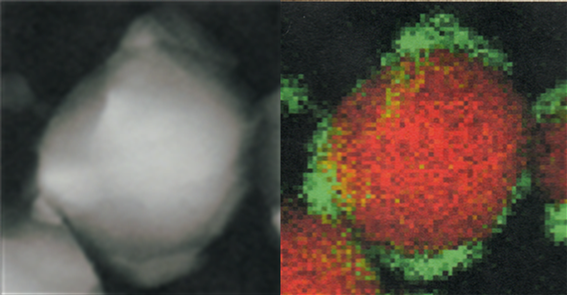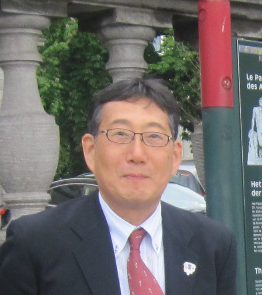 Professor Masakuni Ozawa at Ecotopia Institute, Nagoya University, and his coworkers1 have successfully developed a new promoter for exhaust purification that allows cerium use to be reduced by 30%. This outcome has attracted global attention because Professor Ozawa's research has the potential to contribute to the national resource strategy as well as to environmental conservation through the efficient use of this rare metal.
Professor Masakuni Ozawa at Ecotopia Institute, Nagoya University, and his coworkers1 have successfully developed a new promoter for exhaust purification that allows cerium use to be reduced by 30%. This outcome has attracted global attention because Professor Ozawa's research has the potential to contribute to the national resource strategy as well as to environmental conservation through the efficient use of this rare metal.
To purify car exhaust emissions, catalysts comprising rare metals such as platinum are necessary. A promoter is required to support the catalysts and enhance their functions. Promoters are commonly made of cerium, a rare metal that is not very often found in Japan because of a lack of cerium-containing minerals. Rare metals are essential for Japanese industry and for national growth; however, because of its lack of natural resources, Japan relies on the import of rare metals from other countries. Ensuring the supply and efficient use of these scarce resources and developing alternative resources are of national importance. Therefore, researchers have been attempting to resolve those problems.
Professor Ozawa and his group succeeded in reducing the use of cerium for the purification of exhaust emissions by coating a zirconia surface with cerium. This promoter allows for a 30% reduction in cerium use and exhibits a high purification performance. He has worked with Noritake Co., Limited, and already established a method for manufacturing the promoter. The use of the promoter can even reduce the amount of rare metal used in the catalyst. Professor Ozawa's research outcome is widely expected to help ensure the stable supply of rare metals to Japan in the future.
1. Joint research between Nagoya University, Noritake Co., Limited, and the Nagoya Institute of Technology, funded by the New Energy and Industrial Technology Development Organization.
Professor Masakuni Ozawa
After completing his Ph.D., Professor Ozawa engaged in research and development for 10 years at an industrial firm and then entered academia. Nagoya University is the second university at which he has taught. He has been leading the development of ceria-zirconia, a key material for automotive catalysts that he was the first to discover. Since childhood, he has shown a love for learning and the arts. He was fascinated by stars and space and joined an astronomy club while attending high school. He studied poetry and considered becoming a poet in his twenties. In undergraduate school, he developed a new crystalline material while working at the Synthetic Crystal Research Laboratory, Nagoya University. He believes that these interests and aspirations led him become a researcher.
Outlook for the Future
"I believe the nature of engineering and technology is expressed through natural laws by people's wish to improve their living conditions and make a better world. I specialize in nanomaterials that can improve the environment. I aim to discover the natural laws underlying substances and materials and the materials that reflect these laws. I would like to witness the practical use of my discoveries."
Message to Young Students
 "Seizing a chance in front of you without taking it too seriously and discussing your research topic with people will make you realize that prominent scientists conduct real and dynamic research, unlike the static research described in textbooks."
"Seizing a chance in front of you without taking it too seriously and discussing your research topic with people will make you realize that prominent scientists conduct real and dynamic research, unlike the static research described in textbooks."
Links
Research Information
Professor Masakuni Ozawa Information